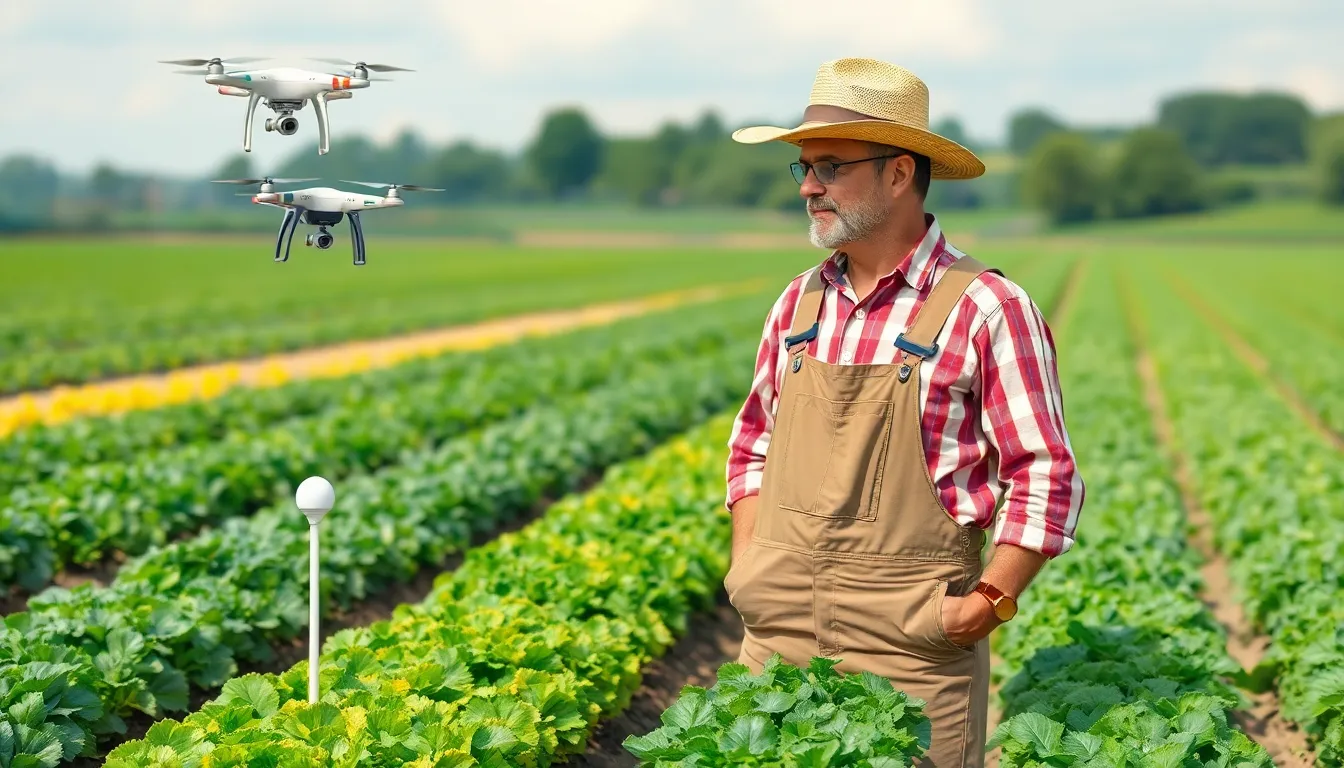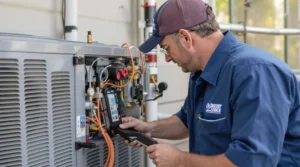In a world where “going green” isn’t just a trend but a necessity, sustainable agriculture technology is like the superhero we never knew we needed. Picture this: farms equipped with cutting-edge tools that not only boost productivity but also hug trees while singing “Kumbaya.” It’s a win-win for both farmers and the planet.
Table of Contents
ToggleOverview of Sustainable Agriculture Technology
Sustainable agriculture technology plays a vital role in modern farming practices. It’s about balancing productivity with environmental health, ensuring that both farmers and the planet thrive.
Definition and Importance
Sustainable agriculture technology refers to techniques and tools that promote agricultural production while minimizing environmental impact. This technology emphasizes resource efficiency, soil health, and biodiversity. Implementing these practices leads to lower carbon emissions and smarter resource management. For instance, precision farming reduces waste and enhances crop yields. It’s not only essential for future food security but also crucial for maintaining ecosystems. Prioritizing sustainable technologies addresses global challenges like climate change and land degradation effectively. Adopting these methods supports farmers economically while protecting natural resources.
Key Components
Key components of sustainable agriculture technology include precision agriculture, biotechnology, and agroecological practices. Precision agriculture utilizes GPS and sensors to optimize field-level management. This ensures effective use of inputs like water and fertilizers, minimizing waste. Biotechnology offers innovative solutions such as drought-resistant crops and pest-resistant varieties. Agroecological practices focus on enhancing ecosystem services through crop rotation and organic farming. These elements work together to create resilient farming systems. By integrating these technologies, agricultural practices become more sustainable, addressing both production needs and environmental concerns efficiently.
Types of Sustainable Agriculture Technology

Sustainable agriculture technology encompasses various techniques that enhance farming practices while safeguarding environmental health. Different methods focus on efficiency and sustainability.
Precision Agriculture
Precision agriculture employs technology to monitor and manage field variability. Sensors collect real-time data on soil moisture, nutrient levels, and crop health. Farmers use this information to apply water, fertilizers, and pesticides more accurately, minimizing waste and environmental impact. Implementing drones further enhances monitoring capabilities by providing aerial views of fields. Research indicates that precision agriculture can increase crop yields by 10-20%, showcasing its significant role in sustainable practices.
Organic Farming Techniques
Organic farming techniques prioritize natural processes over synthetic inputs. This approach includes crop rotation, cover cropping, and composting to enhance soil fertility. Farmers discourage chemical pesticides and fertilizers, opting instead for natural alternatives like neem oil and beneficial insects. Research shows that organic farming can improve biodiversity and soil health, ultimately increasing resilience against pests and diseases. Many consumers prefer organic produce, often leading to higher profit margins for organic farmers.
Agroecology Practices
Agroecology practices integrate ecological principles into farming systems. They focus on enhancing biodiversity and maintaining ecosystem services. Techniques such as intercropping and agroforestry support diverse plantings that improve soil health and pest management. Local knowledge plays a crucial role in developing effective agroecological systems tailored to specific environments. Studies demonstrate that agroecology can reduce reliance on external inputs, contributing to greater food sovereignty and ecological balance.
Benefits of Sustainable Agriculture Technology
Sustainable agriculture technology delivers numerous advantages that influence the environment, economy, and society positively.
Environmental Impact
Sustainable practices significantly reduce carbon emissions. Implementing precision agriculture decreases resource waste, leading to improved water conservation and soil health. Emphasizing organic farming techniques enhances biodiversity, fostering healthier ecosystems. Agroecological approaches promote natural processes, balancing the needs of food production with environmental integrity. Studies show that these practices can increase soil organic matter by up to 20%, improving overall fertility and resilience against climate change.
Economic Advantages
Farmers benefit from sustainable agriculture through increased productivity and profitability. Precision agriculture techniques can raise crop yields by 10-20% while minimizing input costs. Transitioning to organic farming often leads to premium prices for produce, enhancing profit margins. Reduced dependency on synthetic inputs lowers long-term operational costs. Furthermore, sustainable practices can lead to grants and incentives from government programs, providing financial support for innovation in agriculture.
Social Benefits
Sustainable agriculture technology fosters community engagement and food security. Healthier farming practices improve food quality and safety, benefiting consumers directly. Initiatives promoting agroecology create local jobs, strengthening rural economies and reducing migration to urban centers. Education programs associated with sustainable methods increase knowledge sharing, empowering farmers and community members alike. This holistic approach builds a network of collaboration, enhancing resilience against economic challenges and improving overall quality of life.
Challenges in Implementing Sustainable Agriculture Technology
Implementing sustainable agriculture technology faces several challenges that hinder widespread adoption. Addressing these barriers is crucial for farmers and the environment.
Economic Barriers
Economic barriers significantly impact the adoption of sustainable agriculture technology. Initial implementation costs for new technologies can be prohibitive for many farmers, especially smaller operations with limited budgets. Financial resources often prioritize immediate productivity instead of long-term sustainability. Access to funding or incentives for transitioning to sustainable practices may facilitate adoption. Studies reveal that farmers engaging in precision agriculture report increased productivity, yet the upfront investment remains a deterrent for some. Additionally, market demand for sustainably produced products must reflect higher prices to support ongoing investment in technology.
Technological Limitations
Technological limitations pose challenges to effective implementation. Many farmers lack access to advanced tools or resources needed for adopting precision agriculture and other sustainable practices. Insufficient internet connectivity in rural areas creates difficulties in utilizing technology fully. Training and education on these technologies remain crucial, as farmers may require assistance in integrating new systems into their current farming methods. Compatibility issues can arise when incorporating new technologies with existing equipment. Furthermore, continuous research and development are necessary to enhance the usability and effectiveness of sustainable agricultural technologies, leading to broader implementation across various regions.
Future Trends in Sustainable Agriculture Technology
Sustainable agriculture technology continues to evolve rapidly, promising revolutionary changes. Innovations and policy developments shape the future of farming practices.
Innovations on the Horizon
Emerging technologies pave the way for sustainable agriculture. Vertical farming systems can maximize space efficiency, allowing urban areas to contribute to food production. Advanced robotics will likely automate labor-intensive tasks, reducing costs and enhancing efficiency. Blockchain technology provides traceability in supply chains, promoting transparency and trust. Artificial intelligence-driven analytics enable precise decision-making, helping farmers optimize resource use and yield. Lastly, biopesticides and biofertilizers derived from natural sources minimize chemical inputs, fostering healthier ecosystems.
Policy Developments
Government policies play a crucial role in promoting sustainable agriculture technology. Incentives for farmers adopting eco-friendly practices can lead to widespread implementation. Funding opportunities often support research and development of sustainable solutions. Regulatory frameworks are increasingly focusing on environmental impact assessments, ensuring that new technologies meet sustainability standards. Collaborative initiatives between public and private sectors encourage innovation sharing, enhancing overall agricultural resilience. Furthermore, international agreements aim to address climate change concerns, emphasizing the importance of sustainable practices globally.
Sustainable agriculture technology is revolutionizing the farming landscape by marrying productivity with environmental stewardship. As farmers adopt these innovative tools and practices, they not only enhance their yields but also contribute to a healthier planet. The integration of precision agriculture, organic techniques, and agroecological principles fosters resilience against climate challenges while promoting biodiversity.
Looking ahead, continued investment in research and development is essential. Overcoming economic and technological barriers will empower more farmers to embrace these practices. With supportive policies and community engagement, sustainable agriculture technology can lead to a more secure and sustainable food system for future generations. The journey toward a greener agricultural future is underway and holds promise for both people and the planet.



